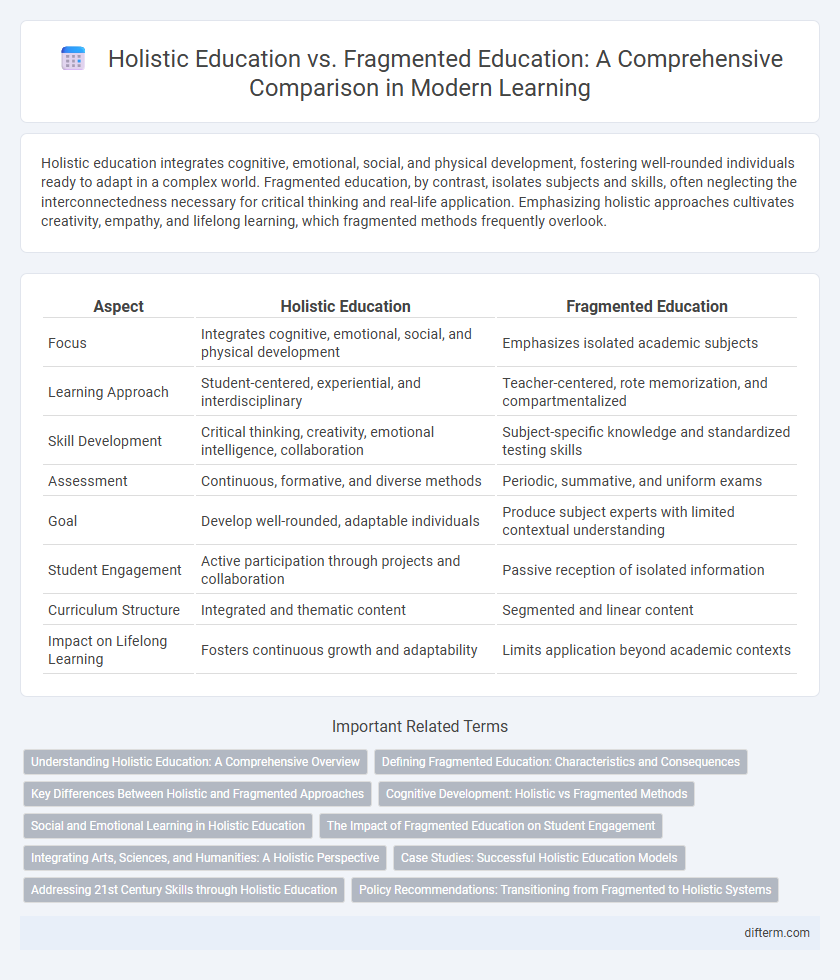Holistic education integrates cognitive, emotional, social, and physical development, fostering well-rounded individuals ready to adapt in a complex world. Fragmented education, by contrast, isolates subjects and skills, often neglecting the interconnectedness necessary for critical thinking and real-life application. Emphasizing holistic approaches cultivates creativity, empathy, and lifelong learning, which fragmented methods frequently overlook.
Table of Comparison
| Aspect | Holistic Education | Fragmented Education |
|---|---|---|
| Focus | Integrates cognitive, emotional, social, and physical development | Emphasizes isolated academic subjects |
| Learning Approach | Student-centered, experiential, and interdisciplinary | Teacher-centered, rote memorization, and compartmentalized |
| Skill Development | Critical thinking, creativity, emotional intelligence, collaboration | Subject-specific knowledge and standardized testing skills |
| Assessment | Continuous, formative, and diverse methods | Periodic, summative, and uniform exams |
| Goal | Develop well-rounded, adaptable individuals | Produce subject experts with limited contextual understanding |
| Student Engagement | Active participation through projects and collaboration | Passive reception of isolated information |
| Curriculum Structure | Integrated and thematic content | Segmented and linear content |
| Impact on Lifelong Learning | Fosters continuous growth and adaptability | Limits application beyond academic contexts |
Understanding Holistic Education: A Comprehensive Overview
Holistic education integrates emotional, social, intellectual, and physical development into a unified learning experience, fostering critical thinking and lifelong learning skills. This approach contrasts with fragmented education, which isolates subjects and skills, often leading to disconnected knowledge and reduced engagement. Understanding holistic education emphasizes personalized learning, interconnected curricula, and the cultivation of empathy, creativity, and resilience.
Defining Fragmented Education: Characteristics and Consequences
Fragmented education emphasizes isolated subject knowledge without integrating skills or critical thinking, leading to compartmentalized learning experiences. This approach often results in students struggling to apply concepts across disciplines and lacking a cohesive understanding of real-world challenges. Consequently, fragmented education can hinder cognitive development and reduce learner engagement and motivation.
Key Differences Between Holistic and Fragmented Approaches
Holistic education emphasizes integrated learning, fostering cognitive, emotional, social, and physical development, whereas fragmented education isolates subjects, limiting interdisciplinary connections. In holistic approaches, students engage in experiential activities promoting critical thinking and creativity, contrasted with fragmented methods that prioritize rote memorization and standardized testing. The key difference lies in holistic education's goal to develop well-rounded individuals prepared for complex real-world challenges, unlike fragmented education's focus on discrete knowledge acquisition.
Cognitive Development: Holistic vs Fragmented Methods
Holistic education promotes cognitive development by integrating emotional, social, and intellectual growth, fostering critical thinking and problem-solving skills through interconnected learning experiences. Fragmented education often isolates subjects, limiting cognitive development to rote memorization and reducing opportunities for creative and analytical thinking. Cognitive benefits in holistic methods include improved memory retention, higher-order thinking, and adaptability, essential for real-world problem-solving.
Social and Emotional Learning in Holistic Education
Holistic education emphasizes Social and Emotional Learning (SEL) as a crucial component, fostering self-awareness, empathy, and interpersonal skills that support overall student well-being and academic success. In contrast, fragmented education often isolates social and emotional development from cognitive learning, resulting in a limited understanding of student needs and reduced engagement. Integrating SEL within holistic education creates a comprehensive framework that nurtures both emotional intelligence and critical thinking, preparing students for real-world challenges.
The Impact of Fragmented Education on Student Engagement
Fragmented education disrupts cognitive coherence by isolating subjects without interdisciplinary connections, leading to reduced student motivation and engagement. This segmented approach often results in surface-level understanding and diminishes the ability to apply knowledge in real-world contexts. Research shows that students exposed to integrated curricula demonstrate higher retention rates and increased enthusiasm for learning compared to those in fragmented educational systems.
Integrating Arts, Sciences, and Humanities: A Holistic Perspective
Integrating arts, sciences, and humanities fosters a holistic education that nurtures critical thinking, creativity, and empathy by connecting diverse disciplines into a cohesive learning experience. Holistic education encourages interdisciplinary approaches that reflect real-world complexities, enhancing problem-solving skills and cultural awareness. Fragmented education, by contrast, isolates subjects, limiting students' ability to synthesize knowledge across fields and hindering the development of well-rounded intellectual capacities.
Case Studies: Successful Holistic Education Models
Case studies of successful holistic education models, such as the Waldorf and Montessori systems, demonstrate improved student engagement, critical thinking, and emotional intelligence compared to fragmented education approaches. These models emphasize integrated learning experiences that address cognitive, social, and emotional development, resulting in higher academic achievement and well-rounded personal growth. Research from institutions like the Harvard Graduate School of Education confirms that holistic education promotes long-term success and resilience in students.
Addressing 21st Century Skills through Holistic Education
Holistic education integrates critical thinking, creativity, collaboration, and emotional intelligence to develop well-rounded individuals capable of navigating complex 21st-century challenges. This approach fosters interconnected learning experiences that enhance problem-solving and adaptability, unlike fragmented education which often isolates subjects and impedes comprehensive skill acquisition. Emphasizing real-world applications and multidisciplinary curricula, holistic education better equips students with essential competencies for global citizenship and lifelong learning.
Policy Recommendations: Transitioning from Fragmented to Holistic Systems
Policy recommendations emphasize integrating interdisciplinary curricula to bridge gaps inherent in fragmented education systems, fostering comprehensive cognitive and socio-emotional development. Emphasizing teacher training programs that promote holistic pedagogical approaches supports seamless transitions and system-wide coherence. Investment in community partnerships and adaptive assessment frameworks reinforces continuous learning and real-world application, aligning educational outcomes with holistic objectives.
Holistic education vs Fragmented education Infographic

 difterm.com
difterm.com